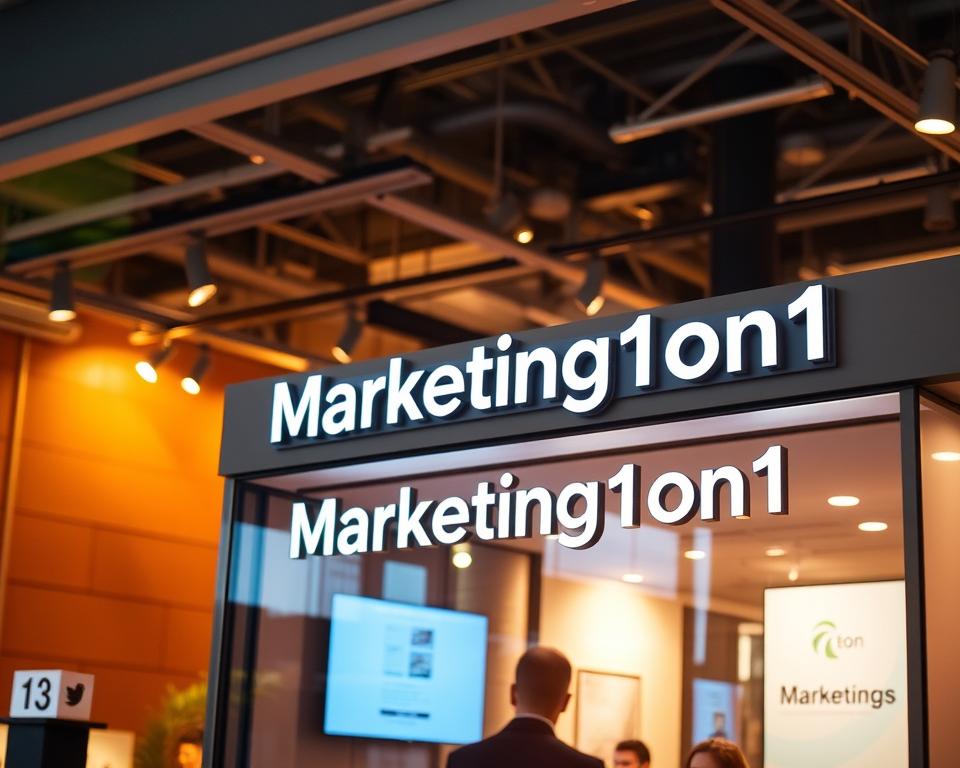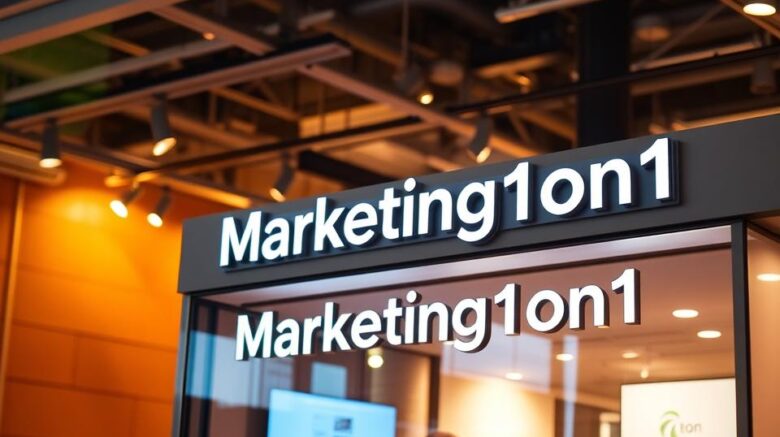1on1 Marketing: Unveil Tailored Customer Engagement.
Have you ever wondered why certain brands resonate with their audience while others fall flat? The answer is 1on1 Marketing, a revolutionary approach that transforms generic marketing into personalized experiences. It focuses on individual tastes, creating a bond that traditional marketing can’t match. It redirects the focus from one-size-fits-all messaging to tailored tactics that speak directly to each customer’s core.
By adopting 1on1 Marketing, businesses can build more meaningful connections. They design strategies that genuinely strike a chord with their audience. Here, we delve into the essence of 1on1 Marketing and how it allows brands to engage with customers individually, 1 on 1 official company website.
The Evolution of Marketing Strategies
The marketing landscape has seen a significant transformation over the years. Initially, marketers used one-size-fits-all strategies, relying on broad messaging for average consumer behavior. Today, the market demands a focus on customer engagement through tailored dialogues. This shift emphasizes the need to understand each customer as an individual, not just part of a group.
With marketing’s evolution, it’s clear that generic tactics fall short. Today’s methods focus on fostering real relationships rather than simply pushing products. By leveraging data insights, marketers move to tactics that cater to each customer’s unique preferences.
This evolution not only deepens customer connections but also boosts brand loyalty and retention. In a world where consumers face endless choices, brands that offer personalized experiences stand out. They craft platforms for dialogue and engagement, ensuring customers feel valued.

| Strategy Type | Characteristics | Example |
|---|---|---|
| One-Size-Fits-All | Mass targeting, general appeal | Mass email blasts |
| Personalized Engagement | Customized dialogues, fine-tuned reach | Custom product suggestions |
Why Personalization Matters in B2B Marketing
As B2B marketing shifts, personalization is indispensable. Marketers aim to boost conversion rates through personalized 1:1 marketing. Research indicates that numerous view this as critical for retention. In today’s fast-paced world, connecting with audiences through effective engagement is critical.
Customization addresses the hurdle of capturing attention. It ensures content resonates with each customer’s unique preferences. Focusing on personal experiences allows brands to shine amid competition.
The rise in customer touchpoints has heightened the need for personalized engagement. Brands that adopt personalized strategies meet customer needs and build lasting connections. Such an approach provides a distinct advantage in today’s market.
Understanding 1on1 Marketing
One-to-one marketing is about tailoring experiences to meet each customer’s unique needs. It leverages data insights to design bespoke engagement tactics. By concentrating on individual experiences, it fosters robust customer bonds.
Imagine a cafe where the barista remembers your go-to order—this is one-to-one Marketing in action. This simple gesture demonstrates how attending to preferences drives satisfaction. It transforms a routine purchase into a memorable experience, enhancing loyalty.
To implement one-to-one marketing, companies must deeply understand customer data. They analyze behaviors and preferences to tailor their messages. This ensures their marketing efforts connect with individual tastes, leading to stronger customer connections and higher satisfaction.
As companies pursue personalized engagement, they recognize that customization is key lasting success. Those who excel in creating individualized experiences gain significant benefits from their efforts.
Advantages of Tailored Engagement
Personalized customer engagement brings numerous benefits to modern brands. It dramatically increases satisfaction by delivering experiences that align with individual needs. Research reveals that 80% of consumers favor brands offering customized interactions. This highlights the significant impact of customized marketing.
Personalized loyalty programs boost retention. By addressing specific pain points and preferences, businesses create an environment where customers feel valued and understood. This connection fosters repeated purchases, driving profitability.
Personalized marketing also leads to higher conversion rates. Tailored recommendations and targeted content guide customers through the sales funnel, improving their journey from consideration to purchase. Emphasizing these benefits enhances brand image and primes businesses for competitive success.
| Benefit | Description | Impact |
|---|---|---|
| Customer Satisfaction | Personalized experiences improve overall customer happiness. | Increased chances of repeat purchases. |
| Rewards Tailored to You | Custom offers boost customer engagement. | Enhanced retention and brand loyalty. |
| Conversion Rates | Targeted content drives customer actions effectively. | Boost in sales and revenue. |
Personalization Challenges
Implementing tailored marketing presents several challenges. Collecting quality data is a primary obstacle. High-quality data is key for segmenting audiences effectively. Without it, marketers struggle to craft messages that truly resonate, leading to missed opportunities and inefficient campaigns.
Brands targeting specific audiences must navigate the fine line between personalized and generic communication. Large corporations often find it hard to maintain one-to-one interactions while heavily relying on automation. This can result in losing the personal touch that customers cherish. – Marketing 1 on 11on1 official company website
Small businesses encounter unique barriers too. They may lack clear messaging, limiting their personalization efforts. Acknowledging these hurdles is crucial for refining strategies and boosting engagement.
Tech That Powers One-to-One Marketing
Groundbreaking technologies in marketing are reshaping the realm of personalized customer engagement. Customer Relationship Management (CRM) systems stand out as a key component. They help businesses manage customer data, vital for creating tailored marketing experiences. A strong CRM enables deeper insight into preferences and behaviors.
AI in marketing improves personalization by enabling more accurate targeting and automating tasks. ML algorithms process large datasets to reveal trends and behaviors. This enables marketers to refine their strategies. Such automation cuts down on manual work and boosts the effectiveness of marketing campaigns.
Studies reveal that 72% of marketers focus on CRM systems for personalization. 55% use automation tools to simplify campaigns. These technologies empower businesses to offer customized experiences on a large scale. They ensure campaigns connect with individuals rather than broad audiences.
The integration of these technologies in marketing fosters a more dynamic approach to customer engagement. The fast-evolving scene drives adoption of cutting-edge tech. These tools not only improve efficiency but also strengthen connections with their audiences.
Top Tips for Effective Personalization
Effective personalized marketing hinges on key best practices. These ensure that efforts resonate with the audience, leading to better engagement. The core elements include:
- Audience segmentation is essential for targeting specific groups based on common traits. This method allows for more precise messaging, boosting engagement rates significantly.
- Using refined communication enhances the customer experience. Consistent, relevant communication across channels builds trust and encourages continued interaction.
- Adopting testing strategies, like A/B testing, is critical. It identifies the most effective tactics by comparing messages and metrics.
Leveraging customer data is crucial to grasp behaviors and preferences. Marketers should regularly analyze this data to refine their strategies. Following these practices enables brands to develop personalization that truly resonates with their audience.
Innovative Personalization Tactics
Creative marketing strategies are key to improving personalized experiences at every customer touchpoint. Brands now use personalized emails that match individual tastes, making messages more impactful. Analyzing purchase history allows spot-on product suggestions, increasing sales.
Creating videos for specific audience segments is another smart move. It grabs attention and builds a strong emotional bond between the brand and its audience. Adaptive loyalty programs that align with behaviors reward meaningful interactions, enhancing the journey.
| Creative Tactic | Description | Benefit |
|---|---|---|
| Personalized Emails | Emails crafted to individual preferences and behaviors. | Increases engagement and conversion rates. |
| Product Recommendations | Suggestions based on previous purchases and browsing history. | Enhances sales and customer satisfaction. |
| Tailored Videos | Video content customized for specific segments. | Deepens brand connection and engagement. |
| Adaptive Rewards | Rewards systems that adapt to individual behaviors. | Increases loyalty and repeat business. |
Companies benefit by weaving customized offers into social media, email, and app alerts. Every touchpoint is an opportunity to showcase commitment to personalized engagement. It crafts memorable experiences, making brands stand out in a crowded landscape.
What’s Next for One-to-One Marketing
The world of 1on1 marketing is rapidly changing, driven by the latest marketing trends. AI will power campaigns tailored to individual requirements. This approach boosts marketing success and builds stronger customer connections by delivering the right content at the right time.
Omnichannel experiences are another key trend. Consumers expect seamless transitions across social, email, and other channels. Brands must ensure consistent messaging to meet these expectations. Understanding where and how customers interact helps create a unified experience, strengthening brand loyalty.
Adapting to these shifts, ethical data practices will become essential for maintaining trust with consumers. Amid rising privacy concerns, transparency and responsibility in data handling are non-negotiable. Prioritizing ethical practices meets regulations and builds trust, paving the way for loyal relationships in one-to-one Marketing’s future.
